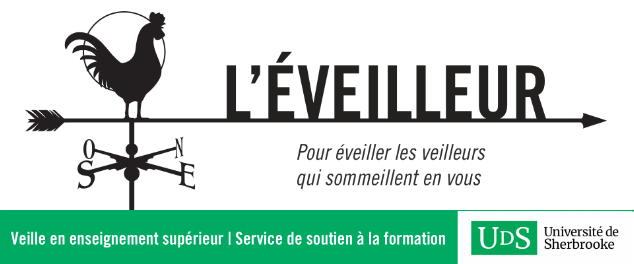Catherine m’a suggéré « Legal Education and the Web », un article du Inside Higher Ed où l’on annonce que l’Université de Washington offrira désormais un programme de maîtrise en droit entièrement en ligne. Le programme s’adresse principalement à des avocats étrangers en exercice, ayant pour clients des firmes faisant affaires aux États-Unis, et qui sont désireux de se spécialiser en droit américain.
L’auteur en profite pour faire le point sur la timidité relative des facultés de droit quant à ce mode de formation… Timidité qui semble s’atténuer, si on en juge par la multiplication de tels programmes aux États-Unis depuis quelques années.
« Nevertheless, Washington Law’s foray into fully online degrees of any kind is the latest of a series of online pushes in legal education, which has lagged well behind most of higher education when it comes to Web-based graduate programs. Washington Law is not the first to offer an online master’s degree (LL.M.) in U.S. law; the Florida Coastal College of Law has offered one since 2010; the New York University Law School, the Loyola University Chicago School of Law and the University of Alabama School of Law offer fully online degrees in specific areas of U.S. law. Along with these pioneers, Washington Law’s decision to create a fully online program, made all the more notable for its vaunted reputation among traditional law schools, might be seen as a bellwether for evolving views on online teaching and learning within a notoriously staid segment of higher education. (This and the previous two paragraphs have been updated since publication). »
À Washington, les responsables du programme ont été rassurés de constater qu’il était désormais possible d’offrir de la formation de qualité en petits groupes (moins de 15) à distance, notamment en menant des discussions synchrones par webcams. Cela permet, par exemple, de préserver le dialogue socratique souvent utilisé dans la formation des juristes.
Il faut mentionner que, jusqu’à présent, les règles internes de la American Bar Association (ABA) tendent à décourager le développement de programmes en ligne :
« Washington’s online law master’s (LL.M.) degree might be a first step down the road toward ABA-approved fully online programs, but it remains uncertain whether it will also be the last step. While many higher-education accrediting bodies no longer view online education as suspect in itself, the bar association has remained leery of allowing too much distance education into law school curriculums. The association’s current governing document for approving law schools disqualifies any program that allows students to take more than 12 credit hours via distance education. There is a proposal to increase that threshold to 15 hours per semester as part of a comprehensive review of those standards, but some observers think it unrealistic that the body would approve a fully online J.D. program in the foreseeable future. » [nos emphases]
Source : Kolowich, Steve, « Legal Education and the Web », Inside Higher Ed, 8 mai 2012.






